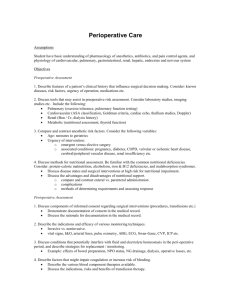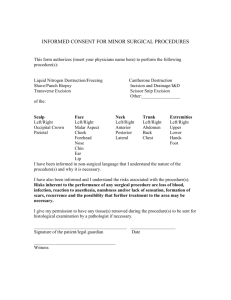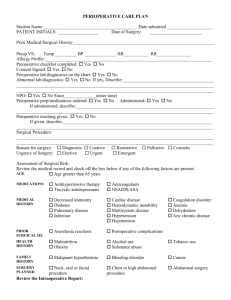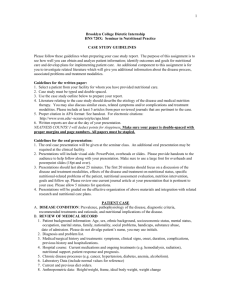JOB DESCRIPTION - Nutritionist / Dietitian
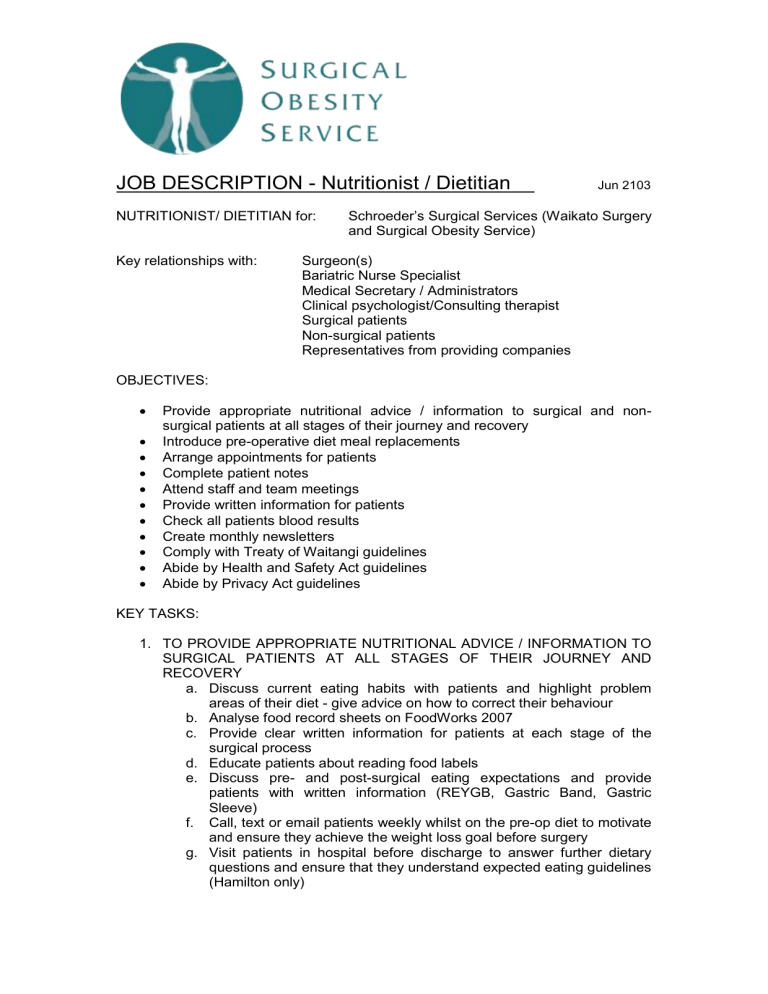
JOB DESCRIPTION - Nutritionist / Dietitian
Jun 2103
NUTRITIONIST/ DIETITIAN for: Schroeder’s Surgical Services (Waikato Surgery and Surgical Obesity Service)
Key relationships with: Surgeon(s)
Bariatric Nurse Specialist
Medical Secretary / Administrators
Clinical psychologist/Consulting therapist
Surgical patients
Non-surgical patients
Representatives from providing companies
OBJECTIVES:
Provide appropriate nutritional advice / information to surgical and nonsurgical patients at all stages of their journey and recovery
Introduce pre-operative diet meal replacements
Arrange appointments for patients
Complete patient notes
Attend staff and team meetings
Provide written information for patients
Check all patients blood results
Create monthly newsletters
Comply with Treaty of Waitangi guidelines
Abide by Health and Safety Act guidelines
Abide by Privacy Act guidelines
KEY TASKS:
1. TO PROVIDE APPROPRIATE NUTRITIONAL ADVICE / INFORMATION TO
SURGICAL PATIENTS AT ALL STAGES OF THEIR JOURNEY AND
RECOVERY a. Discuss current eating habits with patients and highlight problem areas of their diet - give advice on how to correct their behaviour b. Analyse food record sheets on FoodWorks 2007 c. Provide clear written information for patients at each stage of the surgical process d. Educate patients about reading food labels e. Discuss pre- and post-surgical eating expectations and provide patients with written information (REYGB, Gastric Band, Gastric
Sleeve) f. Call, text or email patients weekly whilst on the pre-op diet to motivate and ensure they achieve the weight loss goal before surgery g. Visit patients in hospital before discharge to answer further dietary questions and ensure that they understand expected eating guidelines
(Hamilton only)
h. Follow up patients post-op via phone or email to ensure they are progressing appropriately i. Follow up patients face to face 4-6-weeks post-op j. Follow up patients at 4, 8 and 12 months post-op and advise appropriately for their stage of recovery providing them with written nutritional information k. Follow up patients as frequently as they need to ensure their success l. Discuss methods to get back on track if patients have regained weight; must be able to develop regimes, menu planners and unique ideas for the patient that will work for them m. Ensure that patients are taking their required supplements n. Encourage appropriate exercise programmes with patients as advised by physiotherapist o. Input patient’s post-op data into database for research potential p. Refer patients to other staff members if they have needs that are outside area of expertise q. Monitor patient blood results, and advise patient and staff accordingly
2. TO PROVIDE APPROPRIATE NUTRITIONAL ADVICE TO NON-SURGICAL
PATIENTS AT ALL STAGES OF THEIR JOURNEY a. Provide nutritional information to patients not undergoing surgery, but desiring nutritional advice to achieve weight loss b. Discuss current eating habits and highlight problem areas of diet c. Analyse food record sheets if concerned about patients diet on
FoodWorks 2007 d. Educate patients about how to read food labels e. Give handouts as appropriate f. Call patients during this process for support and advice g. Organise weighin’s as appropriate h. Refer patients to other staff members if they have needs that are outside area of expertise i. Discuss appropriate exercise programmes with patients to help achieve weight loss j. Assist with other non-surgical dietary needs, IBS, Coeliac disease, unexplained bowel discomfort - elimination diet, hiatus herniae, gallstones
3. PROVIDE PRE-OPERATIVE DIET MEAL REPLACEMENTS
Order meal replacements from providers
Offer meal options to patients and arrange admin staff to give to patient
Send meals to patients via courier
4. ARRANGE APPOINTMENTS FOR PATIENTS
Organise follow up phone calls after ICO (Initial consult-Obesity) and during pre-op diet phase
Ensure 2-week follow up phone called is arranged after surgery and check patients have made their 4/6-week follow up appointments
Make contact with patients who have missed follow up appointments and arrange another time and send appropriate info
5. COMPLETE PATIENT NOTES
Keep clear and consistent records of interactions with patients on computer system of all appointments, including phone calls, texts and emails
6. ATTEND STAFF AND TEAM MEETINGS
Write minutes of team meetings and give each team member a copy
(Hamilton only)
Attend meetings and provide information about patients that need further support.
7. PROVIDE WRITTEN INFORMATION FOR PATIENTS
Research appropriate topics and compile clear written nutritional information for surgical and non-surgical patients.
Research digestive diseases and provide written nutritional information and advice at the appropriate time for patients
8. CHECK ALL PATIENT BLOOD RESULTS
Check results daily; reception staff will place hard copy in the in-tray. o Record any abnormalities in patients notes o
If there is a problem then give the concerning bloods to the Nurse
9. CREATE MONTHLY NEWSLETTERS
Write a monthly newsletter for all WLS patients providing them with success stories, altered recipes, nutritional reminders, information about up and coming events (Hamilton only)
10. COMPLY WITH TREATY OF WAITANGI GUIDELINES
To appreciate and respect the principles and aims of the Te Tiriti O Waitangi
11. COMPLY WITH HEALTH AND SAFETY ACT GUIDELINES
To work in a professional and safe manner under the guidelines of the practice Health & Safety policies and also the Office Protocol/Code of
Conduct of Waikato Surgery/Surgical Obesity Service
12. COMPLY WITH PRIVACY ACT GUIDELINES
All tasks should be completed in full compliance of the Privacy Act 1993.
Full patient confidentiality applies

